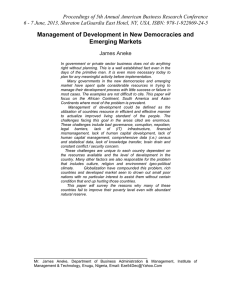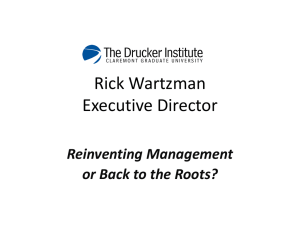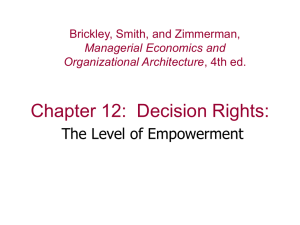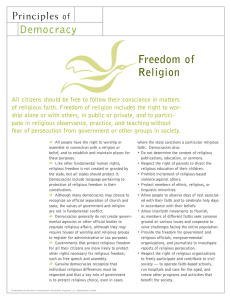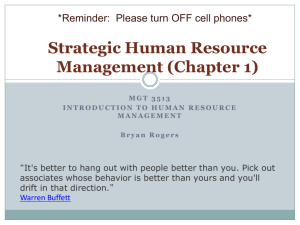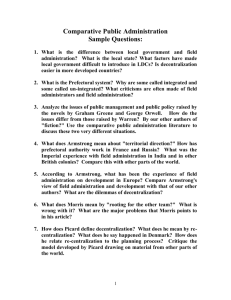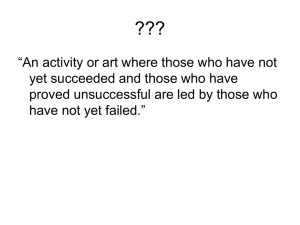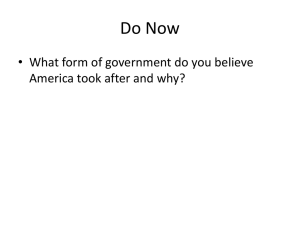The Future of Work Thuy Nguyen September 29 2005
advertisement
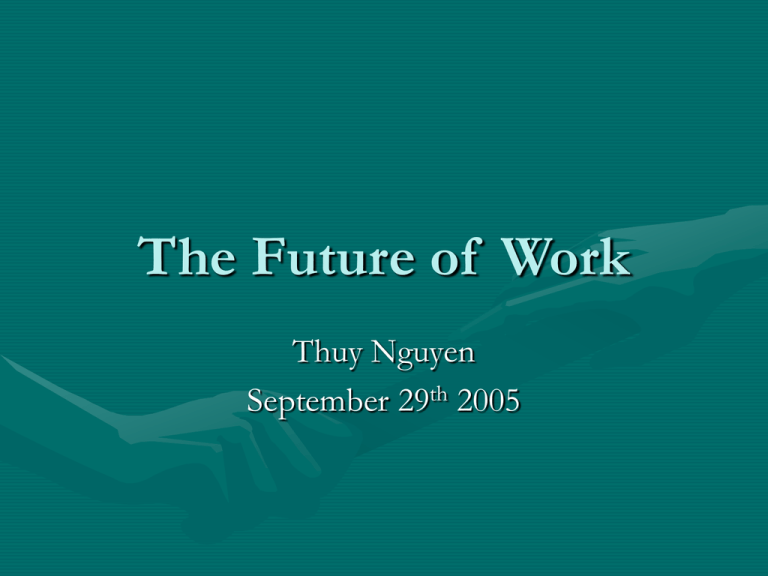
The Future of Work Thuy Nguyen September 29th 2005 Outline • Revolution pattern of organizations • Decentralization – Loose Hierarchies – Democracies – Markets • Organizational & Personal Knowledge Management • Conclusions & Discussions Human Society Revolution Band Kingdom Democracy Organizational Structure Revolution Research universities Political democracies Free markets Internet Traditional military organizations Family businesses Small Businesses (Independent) Corporate Hierarchies (Centralized) Declining costs of communication Networks (Decentralized) Declining costs of communication Benefits of bigness Freedom DECENTRALIZATION The Hierarchy • Definition: – Top-down authority – Abide by direct command from superiors – Please your superiors for incentives • Evaluation: – – – – – Large-scale systems run with little communication Good for conflict resolution Not most efficient use of capabilities Bottleneck crisis Low sense of autonomy Loosening the Hierarchy • Principle: delegate more responsibility down the hierarchy • Successful stories: – – – – Linux open-source software Wikipedia Consulting firms Research universities Democracies • Between controlled hierarchies and open markets • Definition – Multi-channel communication – Decisions made by voting – Must abide group decision • Characteristics: – – – – Participation in decision making Overall good to control Lots of communication required for informed voting Equal right to vote regardless of capabilities Democracies (Cont’d) • eBay: – Online rating system – Making customers feel they’re in charge of business • Mondragon Cooperative Corporation – – – – Group of 150 companies across disciplines 80% worker-owned Ratio of highest to lowest pay no more than 6 Goals: employment stability, regional economic development, social responsibility Unleashing Markets • Let the market decide! • Power & ownership distributed throughout whole market • Stories: – E-Lance economy (Hollywood) – eBay: thousands of freelance retailers working based on TRUST – The Internet • Problem: too much freedom!!! Unleashing Markets (Cont’d) • Strengths: – Efficient allocation of resources – Flexibility – Motivation • Drawbacks: – Overall good giving into self-interests – Lots of communication needed in pair-wise negotiaton. Internal Markets • Set up internal market to coordinate efforts within a company (to achieve a certain goal) • Successful stories: – BP: greenhouse gas emission reduction – HP: quasi markets to form project teams Making your choice • Centralized hierarchies when: – Economize on communication costs – Lots of conflicts to resolve • Markets when: – Maximize creativity and motivation – Want to exploit many ideas simultaneously • Loose hierarchies and democracies when: – All 4 mentioned aspects are important Decentralize or not? • No one in control. How to make decisions quickly and efficiently? • What about quality control? • Are we gonna lose the advantage of economies of scale? • Is knowledge sharing difficult when decentralizing? COSTS compared to BENEFITS Redefine the values of organizations • Put human values at the center of business. • Work around what people want from business. • Ask the question: What matters to you? COORDINATE & CULTIVATE Instead of COMMAND & CONTROL Questions for Discussions • Author explicitly stated that declining cost of communication is the driving force in decentralization. But limited insightful explanations weaved through the book. • Is decentralization only limited to businesses where certain attributes such as creativity, motivation and flexibility are important? How far will decentralization actually go? • Successful free markets require a lot of trust and assume that people like to work and enjoy freedom (Theory Y). Are these characteristics general or exceptional to certain groups of professionals? • How do you know your people are capable of making decisions? And when something fails (such as quality control), how to trace back to where it happened and fix it?
